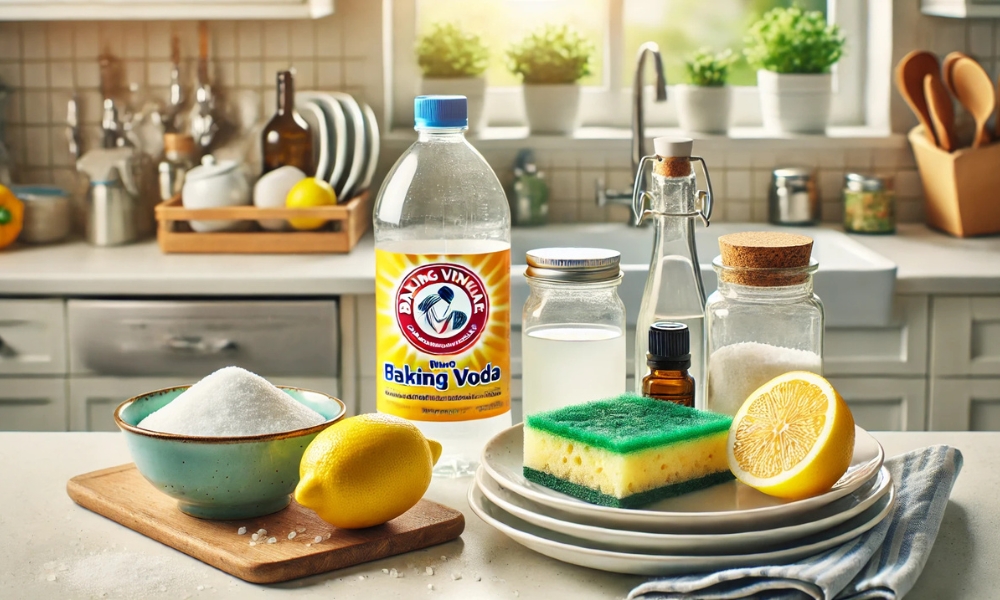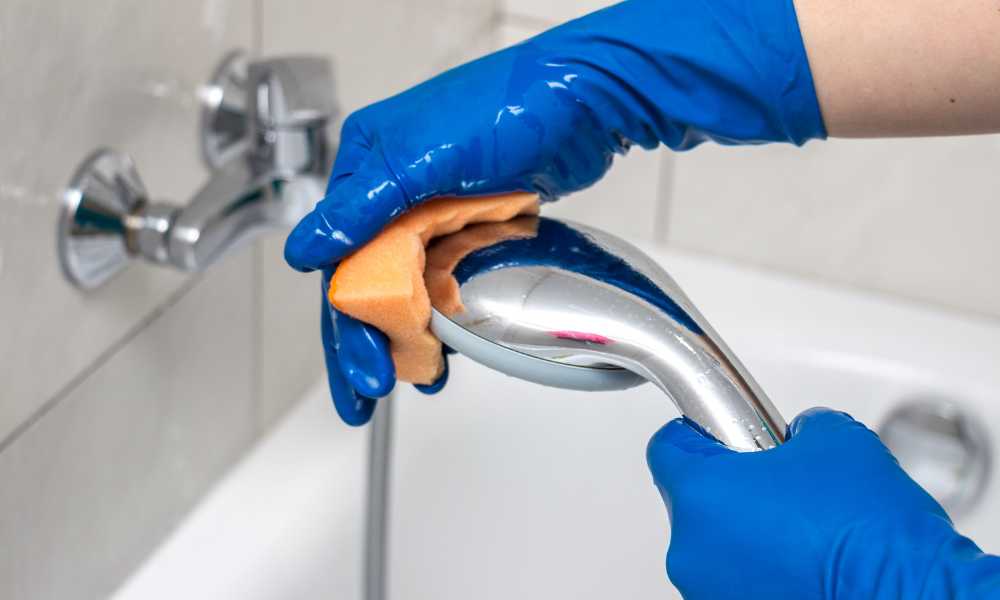Ever found yourself ready to tackle a pile of dirty dishes only to realize you’re out of dish soap? It happens to the best of us, but don’t worry—there are plenty of simple, effective alternatives right in your kitchen. From pantry staples like baking soda and vinegar to fresh ingredients like lemon juice, these natural options can clean, deodorize, and sanitize your dishes just as well as traditional soap. Not only are these alternatives convenient in a pinch, but many of them are eco-friendly and gentle on the skin, making them a great choice for both you and the environment. Let’s dive into the world of dish soap substitutes and discover how to keep your wash dishes sparkling without a drop of detergent.
Why You Might Need Dish Soap Alternatives
Sure, there’s the unexpected soap shortage, but it’s not the only reason to explore alternatives. Dish soaps can sometimes irritate skin, releasing harsh chemicals and artificial fragrances that aggravate allergies or sensitive respiratory systems. Others find that opting for natural alternatives reduces their household’s environmental footprint. Whatever the reason, turning to dish soap alternatives can open up an array of accessible, eco-friendly solutions that fit your lifestyle and values.
Exploring Safe, Effective Alternatives For Sparkling Clean Dishes
When you’re switching out dish soap, two factors reign supreme: safety and effectiveness. You want alternatives that tackle grease, disinfect, and leave your dishes food-safe. Whether mildly abrasive or acidic, various household ingredients work wonderfully as cleaning agents without the additives of commercial soaps.
Common Situations When You Might Run Out Of Dish Soap
Running out of dish soap isn’t the only time these alternatives come in handy. Outdoor picnics, camping trips, or even unexpected gatherings may leave you without soap. Perhaps you’re hosting someone with allergies and prefer to avoid chemical soaps. Whatever the case, having a few tricks up your sleeve keeps you ready to clean your dishes, no matter where you are.
Understanding The Importance Of Dish Cleaning Agents
Clean dishes are not merely about aesthetics—they’re vital for health. Effective dishwashing removes grease, bacteria, and grime that could lead to foodborne illnesses. While alternatives may work differently, they can sanitize, deodorize, and leave your dishes pristine.
How Dish Soap Works To Clean Dishes
Dish soap contains surfactants that lift food particles and grease from surfaces. Most soaps also feature antibacterial agents to eliminate germs while deodorizing. This cleaning magic happens as the surfactants trap and suspend grime particles, which water rinses away.
The Qualities Of A Good Dish Cleaner: What To Look For In Alternatives
A good dish cleaner should be powerful on grease, gentle on hands, and should leave no unpleasant residue. Look for food-safe options that are easy to rinse off and kind to the environment, free from lingering synthetic fragrances that could affect taste.
Safety First: Using Safe Ingredients To Wash Your Dishes
Not every household item is suitable for dishwashing. Stick with non-toxic, food-safe ingredients to ensure a safe Clean Dishes Without Soap. Avoid strong chemicals and opt for gentle alternatives like baking soda, vinegar, and lemon juice that get the job done without risks.
Household Items You Can Use To Wash Dishes Besides Dish Soap
1. Baking Soda: A Versatile, Gentle Scrubber

Baking soda is a humble powerhouse in the kitchen, offering a mild abrasiveness that can tackle grime without scratching your dishes. Known for its deodorizing properties, baking soda also helps to neutralize odors that can linger on dishes and utensils. Sprinkle a bit on a damp sponge or directly onto your dishes, scrub gently, and watch stubborn food residues lift away with ease. Baking soda is especially effective on pots, pans, and items with baked-on food.
2. White Vinegar: Natural Cleaning and Deodorizing Power

White vinegar, with its acidic nature, cuts through grease like a charm. Not only does it clean, but it also acts as a natural deodorizer, perfect for tackling strong food odors on plates, glasses, and silverware. Vinegar’s antibacterial properties make it a trusted choice for sanitizing dishes as well. Simply add a small amount to your rinse water, or use it in combination with baking soda to create a fizzing action that helps dislodge grease and residue.
3. Lemon Juice: Fighting Grease With A Fresh Citrus Scent

The acidity of lemon juice works wonders in breaking down grease while leaving behind a fresh citrus fragrance. Lemon’s natural degreasing properties make it a superb choice for cleaning glassware and cutting boards, especially when food odors or grease are present. A few drops can be added to a bowl of warm water for soaking, or you can rub a lemon half directly on dishes for an extra boost of cleaning power and a burst of freshness.
4. Salt: Abrasive Power for Stubborn Stains

Salt may seem simple, but its coarseness gives it a natural scrubbing ability that works particularly well on pots, pans, and other items with tough stains. Coarse salt can remove stuck-on food and residue that would otherwise resist a gentle wipe. For tougher stains, combine salt with a little lemon juice or vinegar to create a paste, allowing you to scrub away even the most persistent grime.
5. Castile Soap: A Gentle, All-Purpose Cleaner

Castile soap, crafted from vegetable oils, is a gentle, biodegradable option perfect for dishes. It’s effective at cutting through grease and washing away food residues while being safe for skin and environmentally friendly. Castile soap can be diluted with water to create a simple, homemade dish cleaner. Just a few drops go a long way, and its mild nature makes it ideal for sensitive or allergen-conscious households.
6. Washing Soda: Stronger Than Baking Soda for Deep Cleaning

Washing soda, also known as sodium carbonate, is a cousin to baking soda with a bit more strength. It’s especially good at breaking down stubborn grease and food residues on heavily soiled dishes. Washing soda is perfect for the dirtiest pots, pans, and baking sheets. However, it’s best used sparingly and rinsed thoroughly, as it’s more alkaline and may feel harsher than baking soda. For deep-cleaning jobs, it’s an excellent solution.
7. Essential Oils: Adding Antibacterial Properties Naturally

Essential oils such as tea tree, eucalyptus, or lavender are well-regarded for their antibacterial properties. While not cleaning agents on their own, adding a few drops of essential oil to vinegar or a mild soap solution can add a pleasant fragrance while boosting antibacterial power. Not only do they help in disinfecting, but they also leave behind a lingering, refreshing scent, ideal for dishes that need extra odor control. Tea tree oil, in particular, is known for its potent cleansing abilities, while lavender and lemon offer calming, fresh aromas.
Natural Ingredients You Can Combine For Diy Dishwashing Solutions
Certain ingredient combinations enhance cleaning power. For instance, mixing baking soda and vinegar creates a fizzing reaction that lifts grime and grease. Lemon juice combined with salt forms a paste, perfect for stubborn, stuck-on residues. Adding a few drops of essential oils to vinegar adds fragrance and boosts antibacterial action.
Unexpected Items In Your Pantry That Work As Dish Cleaners
Flour: Strange as it may seem, flour can absorb light grease. Simply sprinkle it over dishes, scrub, and rinse away.
Cornstarch: Gentle yet effective, cornstarch polishes dishes and absorbs light oils, making it ideal for glassware.
Club Soda: The carbonation in club soda can help break down and lift grime. It’s surprisingly effective for a quick clean.
Eco-Friendly And Sustainable Alternatives To Dish Soap
Consider eco-friendly bars and plant-based soaps for dishwashing. These alternatives clean without synthetic ingredients, helping to reduce water pollution and protect marine life. They’re ideal for anyone looking to minimize their environmental impact.
Using Fruits And Vegetables For Dish Cleaning
Some fruits and vegetables are natural dish cleaners. Citrus peels contain oils that can cut through grease, while potato peels have starch that absorbs grime. Cucumber slices add a fresh scent and mild deodorizing effect.
Alternatives For Greasy Dishes: Tackling Tougher Cleaning Jobs
For particularly greasy dishes, you may need a bit more muscle. A thick paste of baking soda and water does wonders on stubborn grease. A similar paste made with salt can scrub off tough residues effectively. For glassware, try a lemon-and-club soda combo—it works like a charm.
Alternatives To Avoid When Washing Dishes Without Dish Soap
Not every household item is safe for dishes. Bleach and strong chemicals leave toxic residues and should be kept away from anything that touches food. Harsh abrasives like steel wool can scratch and damage surfaces, so stick to gentler alternatives.
The Benefits Of Natural And Non-Toxic Dishwashing Methods
Choosing natural alternatives reduces exposure to harmful chemicals, benefiting your health and the planet. They’re economical, sustainable, and align with a more conscious lifestyle.
Will Baking Soda And Vinegar Damage My Dishes?
Baking soda and vinegar are generally safe, but be careful with delicate surfaces like non-stick pans, which may scratch easily. Used appropriately, they’re gentle yet effective cleaning agents for everyday dishware.
How Effective Are Dish Soap Alternatives Compared To Commercial Dish Soap?
Commercial dish soaps are convenient, but baking soda, vinegar, and other natural options can achieve similar results. While they may require a bit more elbow grease, the benefits of non-toxic, eco-friendly alternatives are often well worth the extra effort.
Can I Use These Alternatives Regularly For Washing Dishes?
Yes, natural alternatives are safe for regular use. They provide a reliable solution for day-to-day cleaning, though a deep clean with dish soap may still be beneficial now and then.
Conclusion
Dishwashing without traditional soap opens up a world of sustainable, budget-friendly solutions. Whether you’re looking to minimize chemicals or simply ran out of soap, experimenting with these alternatives can keep your kitchen fresh and clean. From pantry staples to fresh produce, these simple ingredients prove that effective cleaning doesn’t have to rely on synthetic soaps. Embrace these natural, eco-friendly options for a home that’s as kind to the environment as it is to your family’s health.


